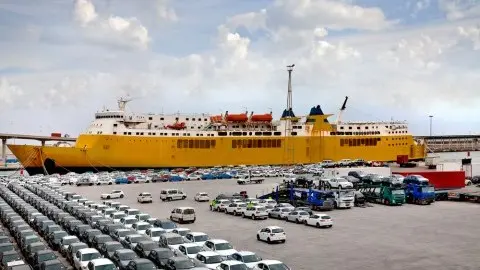Higher US car tariffs would come at a bad time
According to a report from press agency AFP, the US Department of Commerce has labelled the imports of cars a threat to national security. This gives President Trump the option to follow up on his threat to hike import taxes on cars and car parts by 20 percentage points
For the EU economy, the direct effect of higher US import taxes would be limited (-0.1%GDP). But in the midst of the current slowdown and already abating economic sentiment, a tariff hike could be felt indirectly as well through negative effects on business and consumer confidence. This would at least double the negative effect on EU GDP. If the tariff precipitates a ‘tit for tat’ trade battle between the US and EU, economies on both sides of the ocean would be hurt significantly more.
Limited exposure of European autos to US demand
The chart above shows that behind the benign average effect for the EU as a whole (-0.1%GDP), there are significant differences between EU members states. For Germany, the share of total exports of cars and car parts that end up in the US is the highest of all EU countries. But even for Germany's flagship auto industry, a rise in American import tariffs is, in itself, not the disaster many think it is.
Despite having a strong industrial base, Germany's economy is largely made up of services (71%). The car industry adds no more than 4% to German GDP and only one eighth of this depends on exports that end up in the US. Don’t forget that some German car makers like Mercedes and BMW produce 30% to 50% of the cars they sell to Americans locally in the US. The equivalent of the direct damage for the EU as a whole, is a hit of -0.2% for German GDP. Significant but not shocking. Actually, the effect could be somewhat lower because German car exports include many luxury vehicles, which usually suffer a below-average fall in demand when prices rise.
Hungary, Slovakia and the Czech Republic are also strongly associated with the automobile sector. But the direct effect on the overall economy, through lost revenue in the automobile sector, is rather limited as well.
Modest direct effect of car tariffs
If the US were to increase tariffs by 20 percentage points on imported cars and car parts from the EU, worth $50 billion, the direct effect would be limited to little less than 0.1% of EU GDP. This effect is relatively benign because the value added of exports of cars and car parts to the US makes up only a small part of EU GDP (0.27%) and not all of those exports will be wiped out. Germany is most vulnerable to negative demand shocks from the US, followed by Hungary and Slovakia.
Indirect and second-round effects can make things worse
While the direct effect might be surprisingly low, indirect effects are also at play. Given the current slowdown of economic growth in Germany and other EU member states, a tariff hike would come at a time when confidence is already in decline and vulnerable. We estimate that the announcement of a 20 percentage point hike in car tariffs would shave off at least another 0.1% of EU GDP through lower confidence among businesses and consumers. Including indirect effects, our estimate of the total damage for the EU is at least 0.2% of GDP.
The EU has warned the US administration that, if the US imposes higher tariffs on car imports, it will retaliate by putting equivalent tariffs on $23 billion of imports from the US. If this happens, the macro production loss for the EU could initially be lower. When import prices for US products rise, demand for local substitutes increases. We estimate that this will reduce the negative direct effect of lower exports on production and employment by one fifth.
But the experience in the current trade war between the US and China indicates that the mitigating effect of retaliation on production levels could be very short-lived because retaliation could well lead to further protectionist steps by the US government. President Trump sees the imposition of tariffs as necessary to restore a level playing field in trade between the US and its trade partners. In his view, retaliation simply makes trade unfair again and therefore warrants additional tariffs. This ‘tit for tat’ policy led to an escalation of the trade war between the US and China last year.
It should be said that a ‘tit for tat’ trade battle comes at the expense of consumers on both sides of the ocean. They will not only have to pay up for their cars, but for other products as well.
So, the more retaliation, the larger the negative second round effect on purchasing power will be, which in turn, will have a negative feedback into production and employment as well. It goes without saying that a broadening trade war would also be unsupportive for economic sentiment, which would have repercussions for investment and consumer spending.
If a large share of trade between the US and EU becomes subject to higher tariffs, the economic damage would be much more significant on both sides of the ocean. A mutually imposed tariff of 20% on all goods would, by the direct effect alone, cost both the EU and the US around 0.7% of GDP.
Trump plays hard ball
Regarding the question of whether President Trump will follow up on his threat to impose higher tariffs on imported cars, various factors play a role. Some say that Trump will treat the EU with leniency because of long-standing political and economic ties. But it's wise to remember that he showed little sympathy when applying steel and aluminium tariffs to the EU and even to Canada and Mexico. Moreover, Trump has said that the EU is "as bad as China" when it comes to trading fairly with the US. Trump calls himself ‘a tariff man’ which he showed once again after the announcement of General Motors last November to lay off thousands of workers in the US. Trump said that would not have happened with higher import tariffs.
On the other hand, Trump's tone has softened somewhat in recent months. In the end, he wants a trade deal with the EU. That’s why he entered into an agreement last summer with the president of the EU to start negotiations about a trade agreement. They agreed that during the negotiations, no car tariffs would be applied.
Nevertheless, preparatory talks have shown little progress. On the contrary, the latest demand from the US- to include agriculture in the negotiating agenda- has rather complicated the negotiations and diminished the chances that a deal can be struck.
This publication has been prepared by ING solely for information purposes irrespective of a particular user's means, financial situation or investment objectives. The information does not constitute investment recommendation, and nor is it investment, legal or tax advice or an offer or solicitation to purchase or sell any financial instrument. Read more
Tags
Trade warsDownload
Download article
15 February 2019
In case you missed it: More battles lie ahead This bundle contains 9 Articles